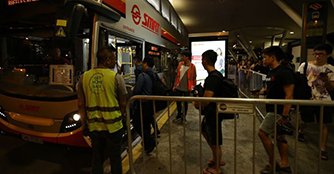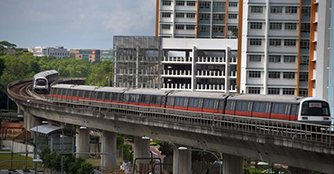Parliament: Fares likely to rise as Government spends more on public transport
07 Mar 2018|819 views
Commuters should see public transport service standards rising in the coming years as the Government continues to invest in buses and trains. But they can also expect fares to creep up as well. During a debate on his ministry's Budget on Wednesday (7th March), Transport Minister Khaw Boon Wan noted that the investments we are making to improve the transport system 'are huge'.
He said the Transport ministry's budget is now the second largest amongst ministries, after the Defence ministry, and ahead of the Health, National Development and Education ministries.
"Over the next five years, we will provide subsidies of about $5 billion for public bus services and $4 billion to renew our rail operating assets," Mr. Khaw said. "Another $20 billion will be invested in infrastructure to further expand the public transport network."
As a result of these investments, service standards will improve. For instance, the bus contracting model had already resulted in an additional capacity for more than 100 bus services.
He also noted that rail reliability has improved significantly, with the North-South Line clocking more than 600,000km before a fault occurs for January and February this year.
This is quadruple the standard the line - which had just had its signalling system upgraded - achieved last year (2017). These improvements to public transport services have increased operating costs 'by about 60 percent'.
This huge cost increase has been borne by the Government and going forward commuters are likely to have to share in the cost rise, added Mr. Khaw.
"Our transport fares are affordable," he said. "To measure affordability, we track the percentage of income that lower income Singaporeans spend on public transport."
"While transport fares must be affordable, we must be careful that they are not priced too cheaply, as maintaining a high quality transport system requires resources," he noted. "Cheap fares are popular, but they are not sustainable."
Mr. Khaw said the Public Transport Council is currently reviewing the fare formula as the 'current formula is inadequate'. "It can be improved to better track total costs," he said. "I am confident that they can work out a fair and sustainable arrangement."
Commuters should see public transport service standards rising in the coming years as the Government continues to invest in buses and trains. But they can also expect fares to creep up as well. During a debate on his ministry's Budget on Wednesday (7th March), Transport Minister Khaw Boon Wan noted that the investments we are making to improve the transport system 'are huge'.
He said the Transport ministry's budget is now the second largest amongst ministries, after the Defence ministry, and ahead of the Health, National Development and Education ministries.
"Over the next five years, we will provide subsidies of about $5 billion for public bus services and $4 billion to renew our rail operating assets," Mr. Khaw said. "Another $20 billion will be invested in infrastructure to further expand the public transport network."
As a result of these investments, service standards will improve. For instance, the bus contracting model had already resulted in an additional capacity for more than 100 bus services.
He also noted that rail reliability has improved significantly, with the North-South Line clocking more than 600,000km before a fault occurs for January and February this year.
This is quadruple the standard the line - which had just had its signalling system upgraded - achieved last year (2017). These improvements to public transport services have increased operating costs 'by about 60 percent'.
This huge cost increase has been borne by the Government and going forward commuters are likely to have to share in the cost rise, added Mr. Khaw.
"Our transport fares are affordable," he said. "To measure affordability, we track the percentage of income that lower income Singaporeans spend on public transport."
"While transport fares must be affordable, we must be careful that they are not priced too cheaply, as maintaining a high quality transport system requires resources," he noted. "Cheap fares are popular, but they are not sustainable."
Mr. Khaw said the Public Transport Council is currently reviewing the fare formula as the 'current formula is inadequate'. "It can be improved to better track total costs," he said. "I am confident that they can work out a fair and sustainable arrangement."
Latest COE Prices
October 2025 | 2nd BIDDING
NEXT TENDER: 05 Nov 2025
CAT A$122,000
CAT B$131,889
CAT C$76,801
CAT E$136,000
View Full Results Thank You For Your Subscription.





















